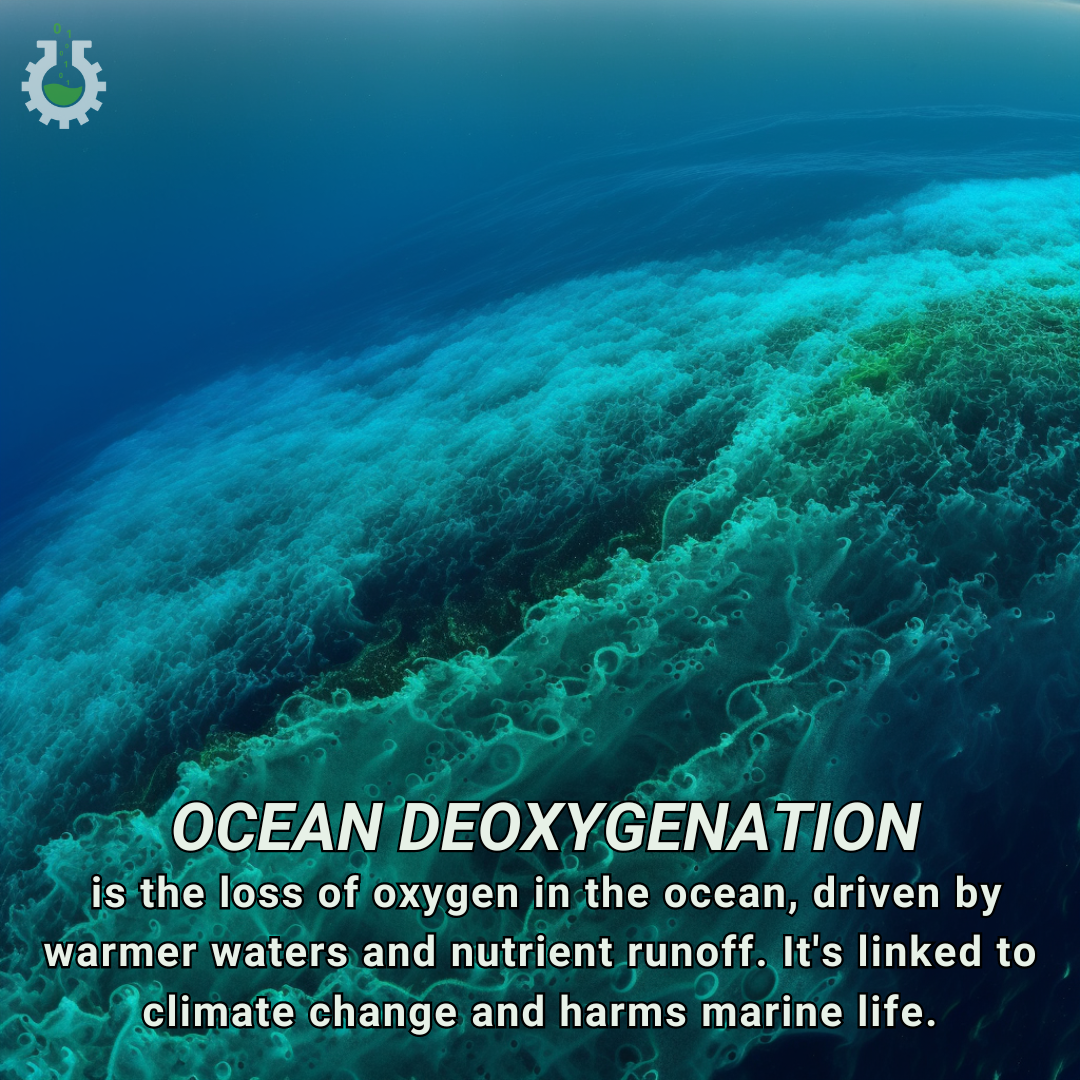June 24, 2024
Climate Change Poster Collection of the Day – Ocean Deoxygenation
Book a Demo
Today’s Climate Change Poster Collection highlights Ocean deoxygenation, a term that might not yet be on everyone’s radar, is rapidly emerging as a silent crisis intricately linked to climate change. This phenomenon refers to the reduction of oxygen levels in the world’s oceans, a consequence of several interrelated factors exacerbated by global warming. As Earth’s climate warms, the oceans absorb a significant portion of this heat, leading to increased water temperatures. Warmer water holds less dissolved oxygen, which directly contributes to deoxygenation. Moreover, the stratification of ocean layers—where warmer, lighter surface waters become increasingly separated from the cooler, denser waters below—hinders the vertical mixing that typically replenishes oxygen levels in deeper waters. This stratification is further intensified by the influx of freshwater from melting polar ice caps, which disrupts the natural circulation patterns of the ocean. Concurrently, nutrient runoff from agriculture and other human activities fuels the growth of algae blooms. When these blooms die and decompose, they consume vast amounts of oxygen, creating hypoxic, or low-oxygen, zones often referred to as “dead zones.”
The proliferation of these dead zones is a harbinger of ecological disaster. Marine life, particularly species that are less mobile or unable to migrate, suffers immensely. Fish, shellfish, and other marine organisms either perish or are forced to relocate, leading to the collapse of local fisheries and the loss of biodiversity. The disruption of these ecosystems has a cascading effect on food webs, affecting not just marine life but also terrestrial species that rely on the ocean for food. For human communities, especially those in coastal regions, the economic and social ramifications are severe. Fisheries, which millions of people depend on for their livelihoods and as a primary food source, face unprecedented challenges. The decline in fish populations can lead to economic instability, food insecurity, and increased competition over dwindling resources.
Ocean deoxygenation also has far-reaching implications for the ocean’s role in climate regulation. Marine organisms, such as phytoplankton, play a crucial role in sequestering carbon dioxide through photosynthesis and the biological pump—a process where carbon is transported from the ocean’s surface to its depths. As deoxygenation affects the health and abundance of these organisms, the efficiency of the ocean as a carbon sink diminishes. This reduction in carbon sequestration capacity exacerbates the greenhouse effect, creating a feedback loop that accelerates global warming. The loss of oxygen also affects the production of nitrous oxide, a potent greenhouse gas, further contributing to climate change.
Addressing ocean deoxygenation requires a comprehensive and multifaceted approach. Reducing greenhouse gas emissions is paramount to slowing the warming of ocean waters. Implementing better land-use practices and managing nutrient runoff can help mitigate the growth of harmful algae blooms. Protecting and restoring marine habitats, such as mangroves, seagrasses, and coral reefs, can enhance the resilience of marine ecosystems to deoxygenation. Additionally, international cooperation and policy frameworks are essential to address this global issue effectively.
Public awareness and education are critical components in the fight against ocean deoxygenation. By shining a light on this under-discussed issue, we can foster a greater understanding of the interconnectedness of our climate system and the vital functions our oceans provide. Scientists, policymakers, and the general public must work together to develop and implement strategies that protect our oceans and, by extension, the health of our planet. As we confront the challenges of climate change, it is imperative to recognize and address the silent crisis of ocean deoxygenation, ensuring the preservation of marine life and the continuation of the essential services our oceans provide.
Discover an inspiring collection of climate change poster.



